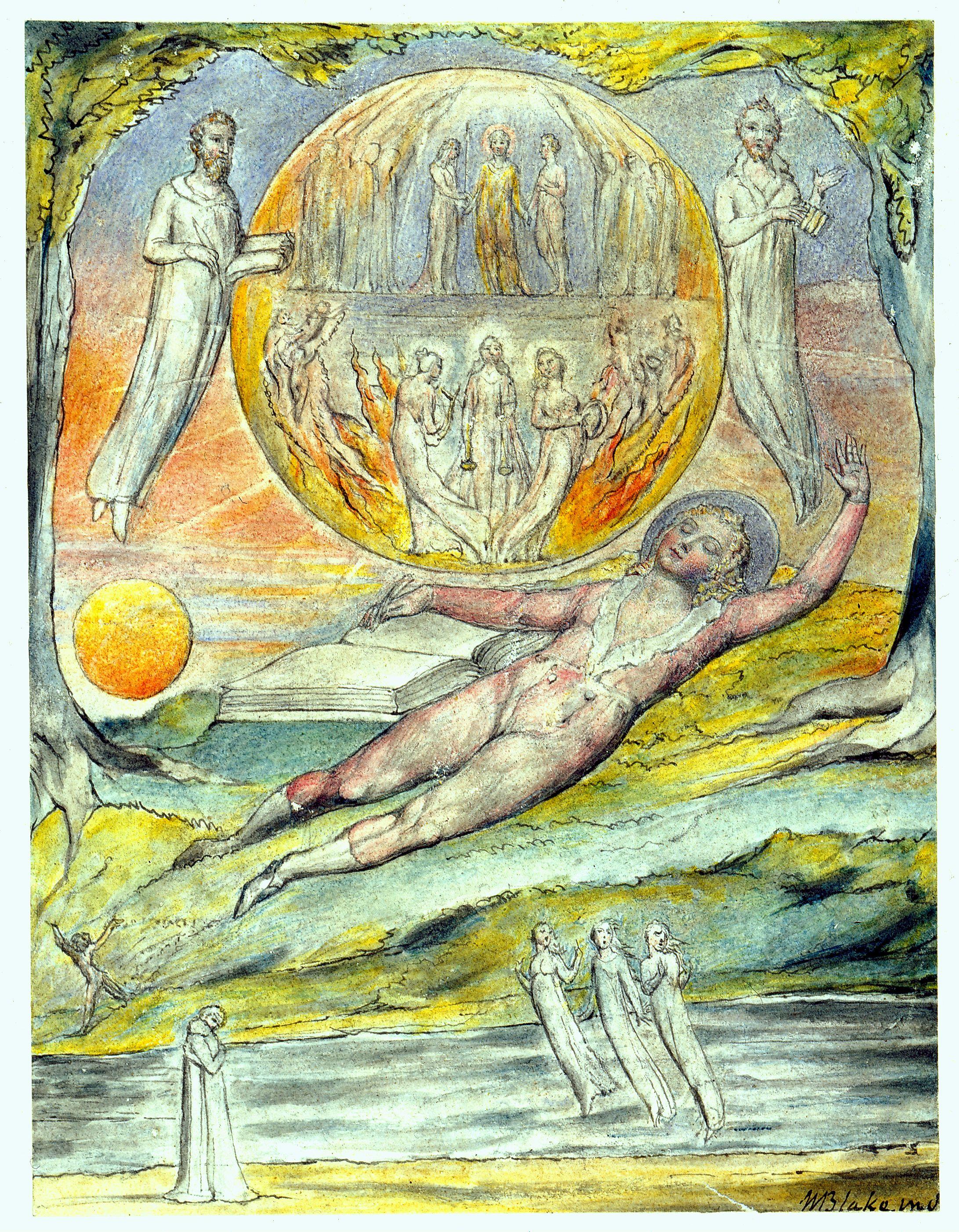Descriptions of
Illustrations to Milton's L'Allegro and Il
Penseroso (E 682)
"There let Hymen oft appear
In Saffron Robe with Taper clear
With Mask & Antique Pageantry
Such sights as Youthful Poets dream
On Summers Eve by haunted Stream
Then lo the well trod Stage anon
If Johnsons learned Sock be on
Or Sweetest Shakespeare Fancys Child
Warble his native wood notes wild"
Blake wrote:
"The youthful Poet sleeping on a bank by the Haunted Stream
by Sun Set sees in his Dream the more bright Sun of Imagination.
under the auspices of Shakespeare & Johnson. in which is Hymen at
a Marriage & the Antique Pageantry attending it"The youthful poet had entered a dream state which offered a pleasant interlude from the cares of the world. He visited with some of the sources of his inspiration: Shakespeare & Johnson are adjacent to the great sun but not within it.
The sun of imagination was welcomed by both Milton and Blake when it generated the flow of ideas and words. Enclosed in the Sun of Imagination are pictured two levels. The upper portrays a marriage with Hymen, the god of Marriage, officiating. He wears the 'saffron robe' and carries the the 'candle clear' although it appears to be unlighted. His function is to join the contraries into a new being.
At the lower fiery level of the great sun are three women, perhaps muses, with lyre, flute and tambourine. The instruments, however, seem to be silenced since there is no movement of the dance pictured. There are other negative indicators pictured including: enclosing trees, a man running away, three women expressing alarm, the setting of the natural sun, and a man and woman in mournful embrace. Nevertheless the youthful poet seems satisfied to have his pen in his hand and his book at the ready for recording his inspired words.
What Milton has been seeking through mirth in L'Allegro has been finding a mental state in which he may be 'Married to immortal verse/Such as the meeting soul may pierce.' He turns next to Il'Peneroso to seek a melancholy avenue to achieve his poetic goals. Blake's final illustration to L'Allegro stresses the contributions of the lighthearted, extraverted mental approach to the life of the poet. The final two lines of L'Allegro are 'These delights, it thou canst give, Mirth with thee, I mean to live.' But Blake points out what Milton himself knew: that there are shortcomings to the mirthful approach including perhaps the detatched, dreamlike state experienced by Thel in the beginning of the book that bears her name.
Thel, Plate 1, (E 3)
"Down by the river of Adona her soft voice is heard:
And thus her gentle lamentation falls like morning dew.
O life of this our spring! why fades the lotus of the water?
Why fade these children of the spring? born but to smile & fall.
Ah! Thel is like a watry bow. and like a parting cloud.
Like a reflection in a glass. like shadows in the water.
Like dreams of infants. like a smile upon an infants face,
Like the doves voice, like transient day, like music in the air;
Ah! gentle may I lay me down, and gentle rest my head.
And gentle sleep the sleep of death. and gentle hear the voice
Of him that walketh in the garden in the evening time."
In another account of a dream state, Blake's Angel is banished from the young man
by his defensive measures. The return of the Angel to the old man was in vain.
Songs of Innocence and of Experience, SONG 41, (E 24)
"The Angel
I Dreamt a Dream! what can it mean?
And that I was a maiden Queen:
Guarded by an Angel mild:
Witless woe, was ne'er beguil'd!
And I wept both night and day
And he wip'd my tears away
And I wept both day and night
And hid from him my hearts delight
So he took his wings and fled:
Then the morn blush'd rosy red:
I dried my tears & armed my fears,
With ten thousand shields and spears,
Soon my Angel came again;
I was arm'd, he came in vain:
For the time of youth was fled
And grey hairs were on my head."
A complex image of the sleep state which Blake may be suggesting in this
illustration is described in Blake's Milton:
Milton, PLATE 15 [17],(E 109)
"As when a man dreams, he reflects not that his body sleeps,
Else he would wake; so seem'd he entering his Shadow: but
With him the Spirits of the Seven Angels of the Presence
Entering; they gave him still perceptions of his Sleeping Body;
Which now arose and walk'd with them in Eden, as an Eighth
Image Divine tho' darken'd; and tho walking as one walks
In sleep; and the Seven comforted and supported him."

No comments:
Post a Comment